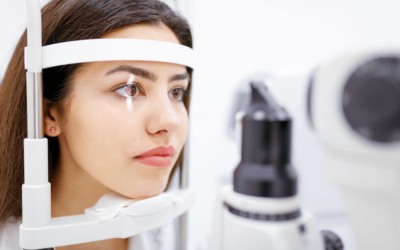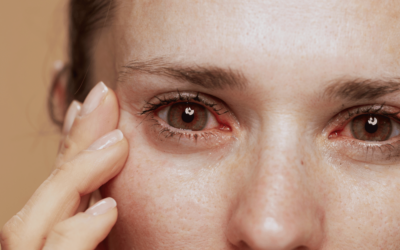We all look forward to May in the Council Bluffs and Omaha areas because that typically means better weather, longer days, and more time outside. May has also been declared to be Healthy Vision month by the National Eye Institute to stress the importance of taking care of our eyes. When your vision seems fine, it can be easy to take your eyesight for granted, but your eyesight is precious and should be protected.
In honor of Healthy Vision Month, and in the interest of helping people in our community maintain healthy eyes and vision, we’re sharing some top tips on how you can protect your eyesight.
Eat eye-healthy foods.
Getting proper and adequate nutrition is a key part of maintaining healthy eyes and vision. Aim to eat plenty of fruits and colorful or dark green vegetables, such as squash, spinach, kale, collard greens, and red bell peppers. The American Optometric Association states that researchers have linked eye-friendly nutrients, such as lutein and zeaxanthin, vitamin C, vitamin E, and zinc, to reducing the risk of certain serious eye diseases like age-related macular degeneration and cataracts. You can find these antioxidants in green leafy vegetables, fruits, nuts, and a lot of other foods.
Don’t smoke.
At this point, we all know that smoking is bad for your overall health, and that includes your eye health as well. While it can be a difficult habit to break, smoking can lead to an increased risk of developing sight-threatening eye diseases such as age-related macular degeneration, cataracts, and glaucoma. If you have dry eye syndrome, smoking will worsen your symptoms and lead to increased discomfort. If you smoke, work on a plan to stop smoking for good. This is one good step to take to help you maintain healthy eyes and vision.
Get regular exercise.
Exercise has so many positive benefits for your body and your mental health, too. Regular exercise at least 3-4 times each week on a consistent basis can help you reduce stress, strengthen your heart, and reduce your blood pressure. Additionally, if you have diabetes, exercise is a key part of managing the condition. High blood pressure and diabetes can lead to eye diseases that can threaten your eyesight, even for younger people. It’s important to keep these conditions under control with regular exercise and other lifestyle changes.
Protect your eyes from the sun.
After the long winters, it’s so nice to spend time outside and go on vacations, but the sun can be harmful to your eyes over time. One step to take to safeguard healthy eyes and vision is to wear quality sunglasses when you spend time outside which block 100% of both UV-A and UV-B rays from the sun. Everyone should wear quality sunglasses, including babies, children, and adults. In addition to providing protection from the sun, quality sunglasses will give you more comfort, less glare, and better vision, too, so that you can enjoy your time outside even more. Ask us about our options!
Also, wear a wide-brimmed hat if you’re going to be outside for a while to provide extra protection from the sun’s UV rays.
Wear protective eyewear when appropriate.
If you work in a manufacturing environment, then your employer may require you to wear safety glasses. If you work in an office or from home and are in front of computer screens all day, consider wearing computer glasses with lenses that block blue light and reduce symptoms of digital eye strain.
Don’t forget to wear protective eyewear when working on a do-it-yourself project at home, either. Too many people injure their eyes while doing yard work or household chores each year. If you or your kids play sports, make sure you have the appropriate protective eyewear for the sport being played. Protecting your eyes from injury is one of the best and simplest things you can do to maintain eye health and vision.
Pay attention to changes in your vision.
If you notice that your vision is not as sharp as it used to be, give us a call at Ideal EyeCare to schedule an appointment for an eye exam. It may be that you simply need an updated prescription for eyeglasses or contact lenses. However, there may be other issues causing the change which can only be diagnosed by a doctor during an eye exam. If you’re experiencing changes in your vision along with red eyes, eye pain, flashes of light, or a sudden increase in the number of eye floaters, contact us immediately as these can be signs of a more serious problem that needs immediate attention.
Get regular comprehensive eye exams.
It’s important to come in for a comprehensive eye exam on a regular basis, even if you feel that your vision is fine. There are many different diseases and conditions that have little to no symptoms which a comprehensive eye exam can reveal. Your eye doctor can spot other issues, too, which may be happening elsewhere in your body, during a comprehensive eye exam. For that reason, getting your eyes checked is an important part of your overall health care.
At Ideal EyeCare in Omaha, NE, and Council Bluffs, IA, our doctors provide friendly, expert eye care for every member of the family.
If it’s been a while since your last comprehensive eye exam, please schedule an appointment with us. Many eye diseases and conditions have little to no symptoms in the early stages, so even if you feel your vision is fine, coming in for regular eye exams is an important part of maintaining your vision.




